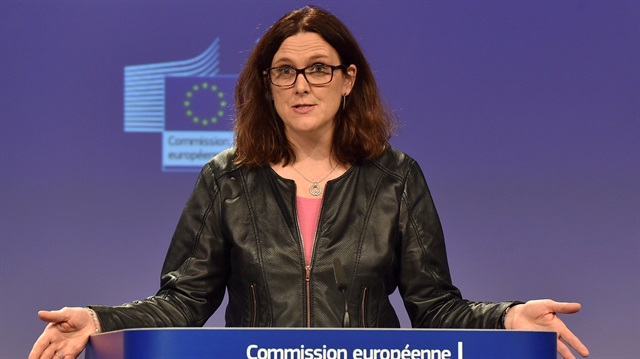

European Commissioner Cecilia Malmstrom
The European Union has yet to begin even "pre-work" towards a transatlantic trade agreement on industrial goods aimed at averting a tariff war with U.S. President Donald Trump, Trade Commissioner Cecilia Malmstrom said on Friday.
Addressing a meeting of EU trade ministers, Malmstrom said there was progress in ongoing efforts to improve trade ties with the United States by cooperating on regulations, but she suggested a deal on reducing import duties was a long way off.
"We are not negotiating anything with the U.S... The pre-work on a possible trade agreement on industrial goods hasn't really started yet. We've been focusing now on the regulatory cooperation part," she said.
The EU ministers met to debate what to offer the United States to ease trade tensions and avert a return to a tit-for-tat tariff conflict.
Trump agreed in July to hold back on a threatened 25-percent import tariff on EU cars while the United States and Europe discussed removing trade barriers, including duties on industrial goods.
Malmstrom said she would meet U.S. Trade Representative Robert Lighthizer in late November to see whether there could be agreement on regulatory issues.
"There are certain things that are quite low-hanging fruit. Over the years we have done a lot of preparatory work. Other things will be a little longer," Malmstrom said.
Austria, which holds the six-month rotating presidency of the European Union, put forward a paper ahead of Friday's meeting suggesting EU countries could agree that transatlantic talks should focus on cooperation in regulation.
This could include agreements that each side recognise as sufficient the other's safety standards in cars, pharmaceuticals and medical devices. For example, a seat belt meeting EU standards could be sold in the United States, and vice versa.
German Economy Minister Peter Altmaier said the meeting in Innsbruck, Austria, was taking place against a "very, very difficult" international environment.
"Time is getting tight. We must hurry up," he said. "We are working for an agreement that covers as many industrial goods as possible. That is our clear position."
French minister of state Jean-Baptiste Lemoyne suggested any transatlantic agreement would be limited, emphasising that agricultural products, among the United States' major exports, would not be included.
Lemoyne said the European Union could conclude comprehensive trade agreements only with parties that have signed up to the Paris climate accord, which Trump has abandoned.
"There needs to be consistency between our climate, our environmental commitments and our trade commitments," the French minister said. "We are in a process of dialogue... to look at certain segments in certain industries. So this is something much more restricted than the classic trade agreements."
#EU
#US
#trade



